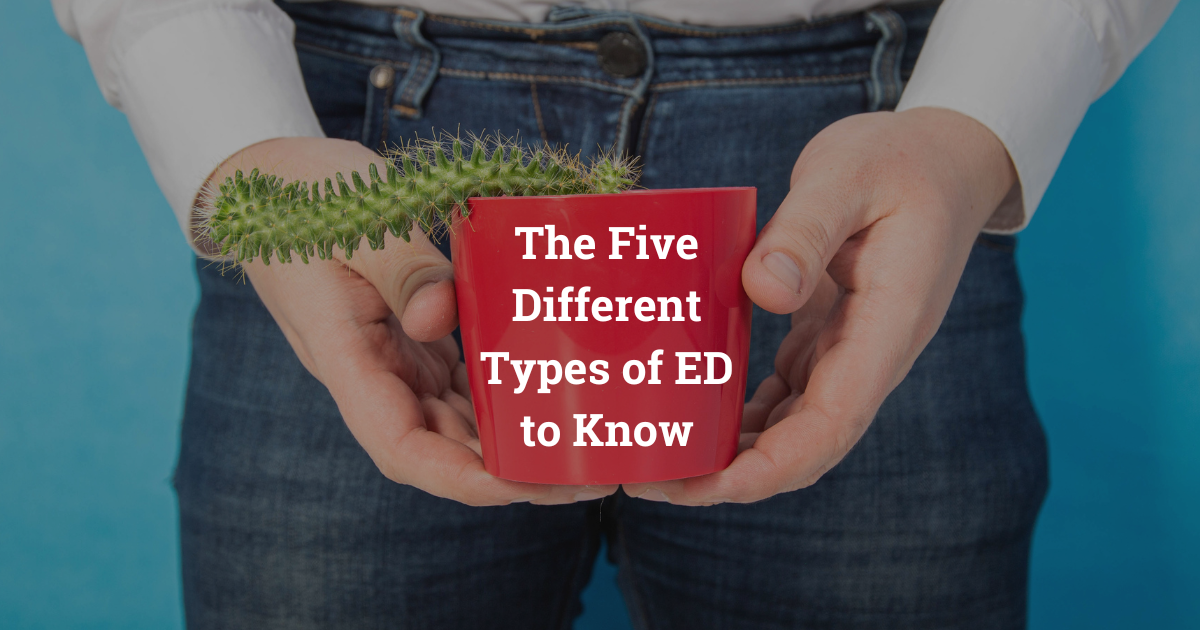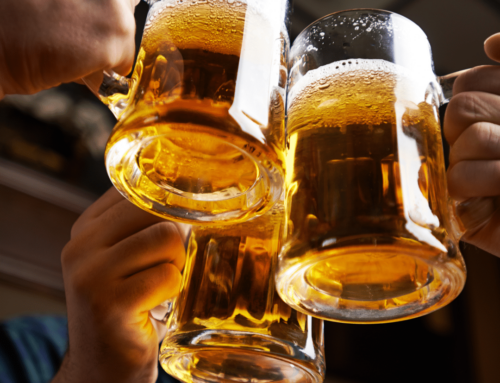While ED is a common condition, three out of four men consider it too embarrassing to talk about. This is understandable given how many men view sexual performance as a significant part of their self-esteem. In this blog post, we’ll look at the five different types of erectile dysfunction, causes, and treatment options.
What is Erectile Dysfunction?
Erectile dysfunction, more commonly known as ED, is a condition in which a man cannot achieve or maintain an erection. It’s estimated to affect anywhere from 10% to 50% of men in the US alone.
This condition can take place at any age, but it’s more common in men over the age of 40. Between the ages of 40 and 70, the total number of men experiencing ED triples from about five to 15%. It’s important to be mindful of the notion that this is only the number of self-reporting men. The actual number is likely much higher because men are too ashamed or embarrassed to discuss their experiences openly.
ED can be caused by mental circumstances, physical factors, or a combination of both. The physical causes of ED include inadequate blood flow to the penis, nerve signaling deficiencies, and hormonal imbalances. Psychological causes often include anxiety, stress, relationship problems, and depression.
Regardless of the cause, ED is humiliating for most men. It’s also difficult to resolve unless you know what to look for. Let’s dive into one of the most common causes of ED, which is lack of blood flow to the penis.
1. Lack of Blood Flow
The most common physical cause of ED is inadequate blood flow to the penis. Several physical conditions can predispose men for this problem, including atherosclerosis (the medical term for hardening of the arteries), high blood pressure, diabetes, and obesity.
Atherosclerosis has numerous causes, but three common ones include excessive consumption of alcohol, smoking, and a diet high in saturated fat. Such foods include bacon, cream, processed meat, cakes, and butter. These lifestyle habits foster plaque buildup in your arteries, which reduces blood flow not only to your penis but throughout your entire body.
Diabetes can cause damage to the blood vessels and nerves in the penis which can result in ED. Obesity increases the risk of atherosclerosis, diabetes, high cholesterol, and hypertension — all which can result in ED.
High blood pressure means that your body is working overtime to distribute blood throughout your body. This can result in damage to the blood vessels and tissue in the penis. When you’re trying to get an erection, it’s more difficult because your body then must try to pump even more blood to damaged blood vessels in your penis.
2. Mental Health Issues
Mental health issues such as anxiety, depression, and comparing oneself to others is one of the other primary types of ED. Anxiety and depression can cause you to feel unsure about what to do in the bedroom, leading to ED.
Anxiety is often characterized by lots of recurring mental “What ifs?” whereas depression is characterized by constantly asking oneself, “What’s the point?” Feeling like a sexual experience will end in disappointment no matter what can block the ability to get an erection.
Relationship problems can lead to ED as well. A man may be thinking about events that have taken place between himself and his partner. If he’s not feeling confident and relaxed, it’s hard to get an erection.
Inconveniently, some of the medications used to treat mental health diseases can also contribute to ED. These medications may include antidepressants, anti-anxiety medications, and antipsychotics. If you’re on mental health medication but believe you may be experiencing ED as a result, speak with the professional who issued your prescription.
3. Too Much Stress
Stress is a third and commonly contributing factor of male impotence. Stress causes physical changes in the body including the increase of cortisol. Facing a difficult or threatening scenario causes your body to release adrenaline, which is followed by cortisol.
Unfortunately, chronically high levels of cortisol can lower testosterone levels. Since testosterone is critical to your sexual performance, it’s crucial to be at ease whenever the bedroom is on your mind.
If you’re having trouble feeling relaxed whenever you need to get it up, here are a few simple recommendations to reduce lifestyle stress:
- Get plenty of quality sleep every night
- Identify chronic stressors in your life and eliminate them
- Eat testosterone-boosting foods, like mushrooms, fish, leafy greens, eggs, oats, nuts, and seeds
- Exercise vigorously on a regular basis
4. Central Nervous System Issues
Nerve signaling is controlled by your central nervous system (CNS). When your body’s nerve signaling capacities are working correctly, your arteries naturally relax and allow blood flow to increase to the penis. When it isn’t working correctly, it’s often a sign of previous nerve damage. Parkinson’s disease, multiple sclerosis (MS), spinal cord damage, and surgery (specifically prostate surgery) are all possible causes.
In cases like these, it’s best to seek professional medical help. If you already had one of these conditions but only recently experienced ED, speak with your most recent doctor. If you’re experiencing issues for the first time, seek help from a vetted neurological disease expert.
5. Hormonal Imbalance
Hormonal imbalance is yet another common cause of ED. This occurs when you don’t have enough free-flowing testosterone in your body on a regular basis.
Specific hormones in unhealthily high levels are known to hinder the ability to get and maintain erections. These hormones include thyroxine, prolactin, and cortisol. Thyroid hormones like thyroxine regulate metabolism and imbalanced amounts can cause a decrease in sexual desire and erections.
Prolactin is a hormone that helps regulate the reproductive system; too much of it and you’re likely to experience headaches in addition to ED. Cortisol prepares the mind and body for stress but counteracts testosterone.
Not feeling relaxed or ready for the bedroom? Here are a few safe ways to naturally increase your testosterone:
- Exercise regularly (without overdoing it)
- Eat healthy fats like nuts, avocados, and coconut oil
- Take a vitamin D supplement
- Get seven to eight hours of sleep every night (and resolve any sleep debts rapidly)
- Avoid scented products like air fresheners and candles (these have estrogen in them)
Diagnosis and Treatment Options for Erectile Dysfunction
If you’re experiencing symptoms of ED, it’s important to talk to medical professionals. Specialists will run tests to determine the cause of your ED and recommend customized treatment options.
The ED treatment you should go with depends on what you hear from a medical service provider. If your ED is caused by a physical condition, such as obesity or high blood pressure, a new fitness and dietary regimen is often the answer. If ED is caused by psychological issues such as anxiety or depression, counseling or therapy may help.
Holistic lifestyle changes will almost always help you get rid of ED. Challenging, regular exercise and eating a well-rounded, whole foods diet can lessen ED by increasing blood flow to the penis. Quitting smoking and reducing stress are also must-haves for resolving this issue.
The Bottom Line
If you’re experiencing ED but don’t know who to turn to, we can help. Schedule your free in-clinic consultation with a member of our team. Have questions before booking a consultation? Call us at 866-227-9495 and we’ll be happy to answer your questions.





